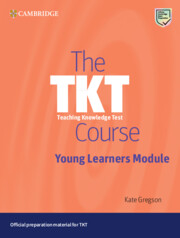Book contents
- Frontmatter
- Acknowledgements
- Contents
- Introduction
- Part 1 Knowledge of young learners and principles of teaching English to young learners
- Part 2 Planning and preparing young learner lessons
- Part 3 Teaching young learners
- Part 4 Assessing young learner learning in the classroom
- Follow-up activities: Answer keys and commentaries
- List of terms found in the TKT Glossary
- Glossary of TKT: Young Learners terms
- Test tips for TKT: Young Learners
- Teaching knowledge test young learners: Practice test
- Sample test answer sheet for TKT: YL practice test
- Answer key for TKT: YL practice test
Unit 3 - Developing thinking skills: How can I help children develop cognitive strategies in language learning?
Published online by Cambridge University Press: 14 March 2024
- Frontmatter
- Acknowledgements
- Contents
- Introduction
- Part 1 Knowledge of young learners and principles of teaching English to young learners
- Part 2 Planning and preparing young learner lessons
- Part 3 Teaching young learners
- Part 4 Assessing young learner learning in the classroom
- Follow-up activities: Answer keys and commentaries
- List of terms found in the TKT Glossary
- Glossary of TKT: Young Learners terms
- Test tips for TKT: Young Learners
- Teaching knowledge test young learners: Practice test
- Sample test answer sheet for TKT: YL practice test
- Answer key for TKT: YL practice test
Summary
LEARNING OUTCOMES
By the end of this unit, you will…
KNOWLEDGE: know more about the role of language learning in helping children to develop cognitive strategies
SKILLS: be able to identify a range of cognitive strategies and ways of helping children to develop them through language learning
■ Starter Question
Before you begin this unit, read the starter question and make some notes. Then read the commentary and compare it to your notes.
What does the term ‘cognitive strategy’ mean to you? Use a dictionary to check if you need to.
COMMENTARY
Cognition is a word meaning thinking, so cognitive strategies are the mental skills children use in order to process and understand the content or the language they are learning. As children practise using cognitive skills in different ways, they will be able to develop them for use outside of language learning. For example, they might predict what happens next part of the way through a story, or deduce the meaning of an unknown word they hear from the context in which they meet it.
Cognitive strategies are important because they are essential to children's learning in all school subjects. Helping children to develop cognitive strategies while they are learning English therefore plays an important part in children's general development as learners and thinkers. Thinking skills development is seen as one of the ‘4Cs’, which are the four main life skills children need to develop to help them be prepared for their future as adults in the 21st century: Communication, Collaboration, Critical Thinking and Creativity.
■ Key concepts
Reflect on the key concept question. Brainstorm your ideas, then expand your notes as you read.
What are the cognitive skills and what kinds of strategies might children use to practise them? Try to think of three or four examples.
COMMENTARY
Part of Bloom's Taxonomy, first published in the 1950s, identified cognitive domains and put six related goals in order of complexity. This was later revised and is now often presented in a hierarchical triangle (see Figure 1) to show how the goals build upon one another. For example, as part of the cognitive process of evaluating something, we need first to understand and analyse it.
- Type
- Chapter
- Information
- The TKT Course Young Learners Module , pp. 25 - 31Publisher: Cambridge University PressPrint publication year: 2024



